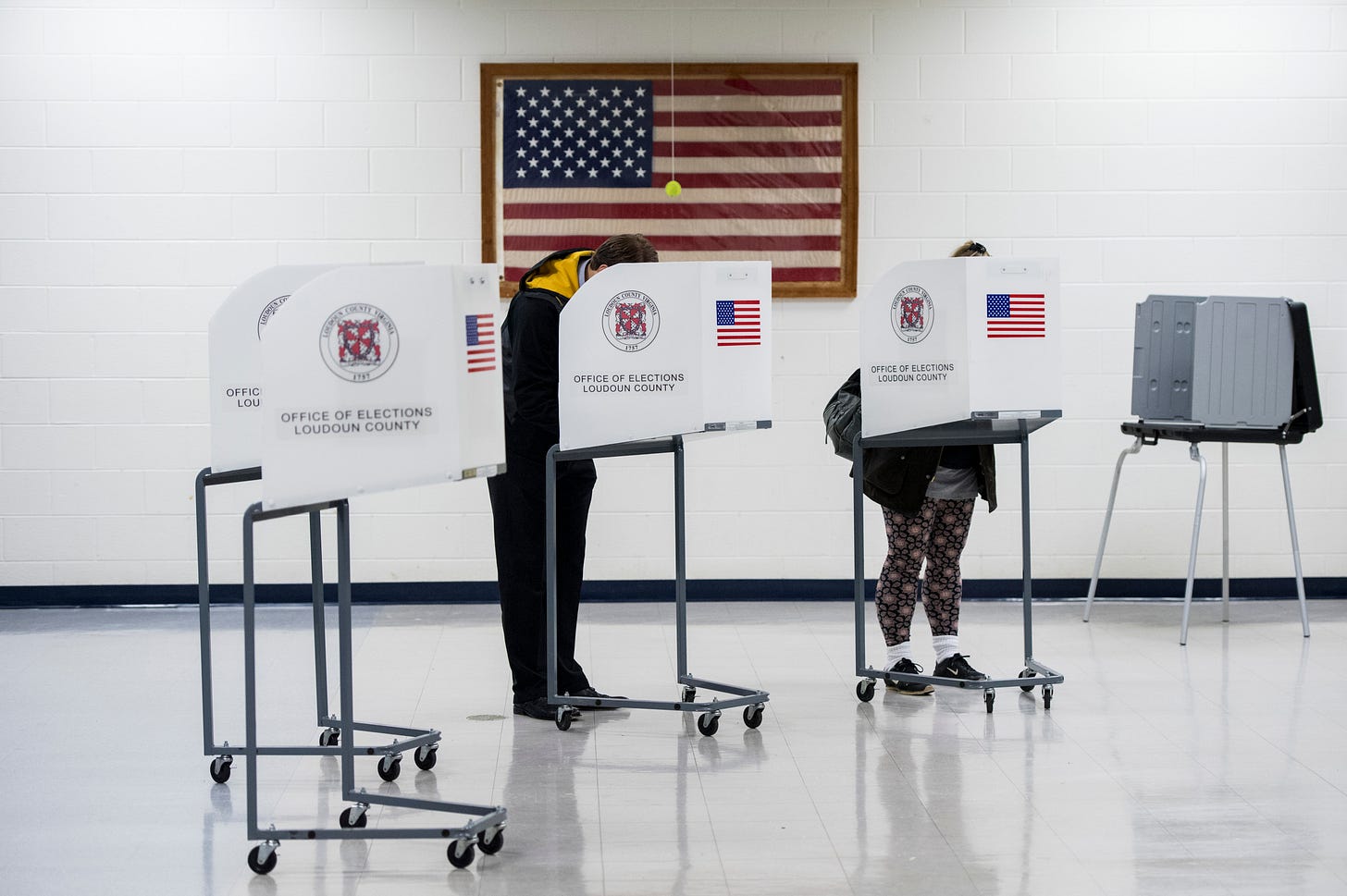Tuned-Out Voters Benefit Trump
Biden needs to capture the attention of the disengaged.
IF YOU ARE READING THIS here at The Bulwark, you are likely a well-informed voter closely following the campaign.1 But chances are many of the people you surround yourself with are not. Ask them why, and they will probably tell you something like, Yeah, I’m going to vote, but I can’t take any more Trump, so life is better without the news.
Voters like that could actually sink Joe Biden’s re-election.
Nearly every friend I have who isn’t in politics, as well as many relatives, have checked out. Most of them did so in November 2020, as soon as Biden won. Many of these disengagers believe Biden will win this year and don’t know that Trump is attracting new votes, is ahead in all of the swing-state polls, and is well positioned for a second term. They don’t know that Trump is openly planning for a new authoritarian government that centralizes power in the presidency and defies the separation of powers. They don’t know he says he intends to prosecute Biden and Gen. Mark Milley and members of Congress who served on the House January 6th Committee. They don’t know that several Republicans vying to be Trump’s running mate won’t commit to accepting the results of the election and believe Mike Pence should not have certified the 2020 election. They haven’t followed any of the cases against Trump and don’t know the New York case that concluded with his conviction last week was—in all likelihood—the first and last Trump will face before the election, or ever. They have no idea that Trump now regularly proclaims internal, domestic enemies “within” are more dangerous to America than China or Russia. They have no idea what Project 2025 is.
They probably didn’t watch this weekend as Republicans, en masse, rejected a verdict, a jury, and the conduct of a judge. Americans who don’t support Biden, and are open to voting for Trump, probably didn’t either.
With roughly 80 percent of the electorate unhappy with the general election rematch between President Biden and former President Trump, it’s not surprising that many voters are looking away.
A Pew Research poll in April found 28 percent of respondents said they aren’t following the election too closely and 13 percent said they aren’t following it closely at all. The survey showed that while more voters were following the election very or fairly closely than the share that was in April 2020, 62 percent of respondents said they are already “worn out” by it. In the same poll from four years ago, that level of fatigue with political news, 61 percent, didn’t register until October 2020. The new polling showed those following closely expressed less burnout than those who aren’t, and Republicans were less likely to say they were worn out than Democrats by a margin of 58–66 percent.
In a series of focus groups Pew conducted a year ago, voters expressed frustration with both parties, and researchers found “they have a sense that politics is everywhere—and often in a bad way. They find themselves overwhelmed by how much information they confront in their day-to-day life.”
The Biden campaign has now concluded that these voters must be targeted with vigorous messaging. Biden’s team had hoped that polls would shift when voters “remembered” Trump and recoiled in horror, but that never happened. Trump leads consistently.
“Our task at this point is engaging them when they don’t want to engage with us,” an unnamed Biden campaign pollster told NBC News. “Not waiting for them to tune in, but instead sort of being there with a persistent message.”
The campaign aims to shore up weakness in the Biden coalition with events that highlight gun violence and the threat to reproductive rights as it has found young and minority voters tuning out “in ways that we haven’t seen before,” the pollster said.
The challenge is twofold. It’s not just that disaffected voters are frustrated with the economy and inflation and choosing between a 77-year-old former president and an 81-year-old current president, but that the movement away from the consumption of mainstream media has escalated since 2020. Younger Americans are increasingly getting their news from TikTok, and Trump is already dominating there.
A new survey by Blueprint, a Democratic-aligned polling operation, offered an opening for the Biden campaign. It showed young people are not aware of most or many of the most offensive statements Trump made as a 2016 candidate and as president but that a majority of respondents were offended once they learned them. Instructively, they took offense with statements Trump made regarding race, women, and immigrants but not his lies about the election being stolen.
It’s hard to reach these voters, and it’s hard to interest these voters, but it is critical since many will make a last-minute decision and vote. Many of the most checked-out voters are supporting Trump. An NBC News poll conducted in mid-April found Trump had a 26-point advantage with the 15 percent of respondents who said they didn’t follow election news closely. Among the 54 percent who said they consume their news from television and newspapers, Biden was ahead by 11 points.
Since many of these disaffected voters are unreachable, it’s critical that formerly engaged Biden voters tune back in. Those who oppose Trump but check out are not energized; they are not sounding the alarm, sharing information, and articulating the stakes.
A recent poll from the Survey Center on American Life reported only 27 percent of registered voters say the 2024 election is the most important of their lifetime. That number is alarmingly low—but it can be raised by increased voter engagement.
Check in on your friends and family. We only have a few more months.
You are also, like most Bulwark readers, above average in the looks department.



